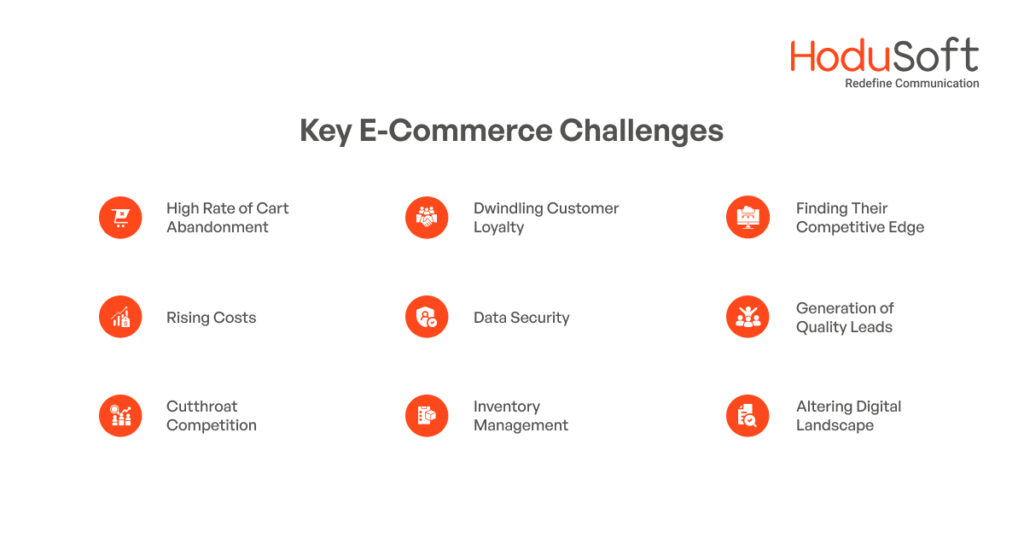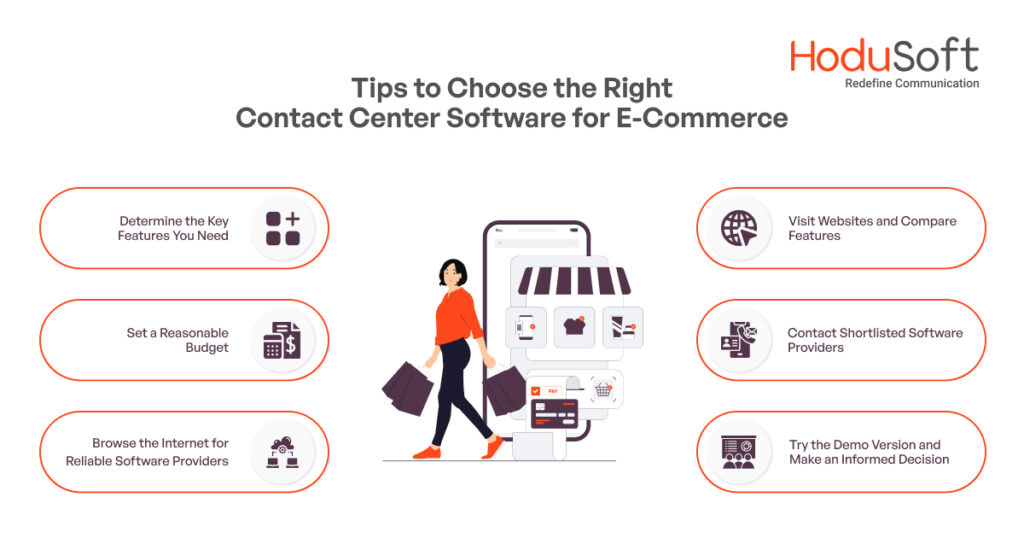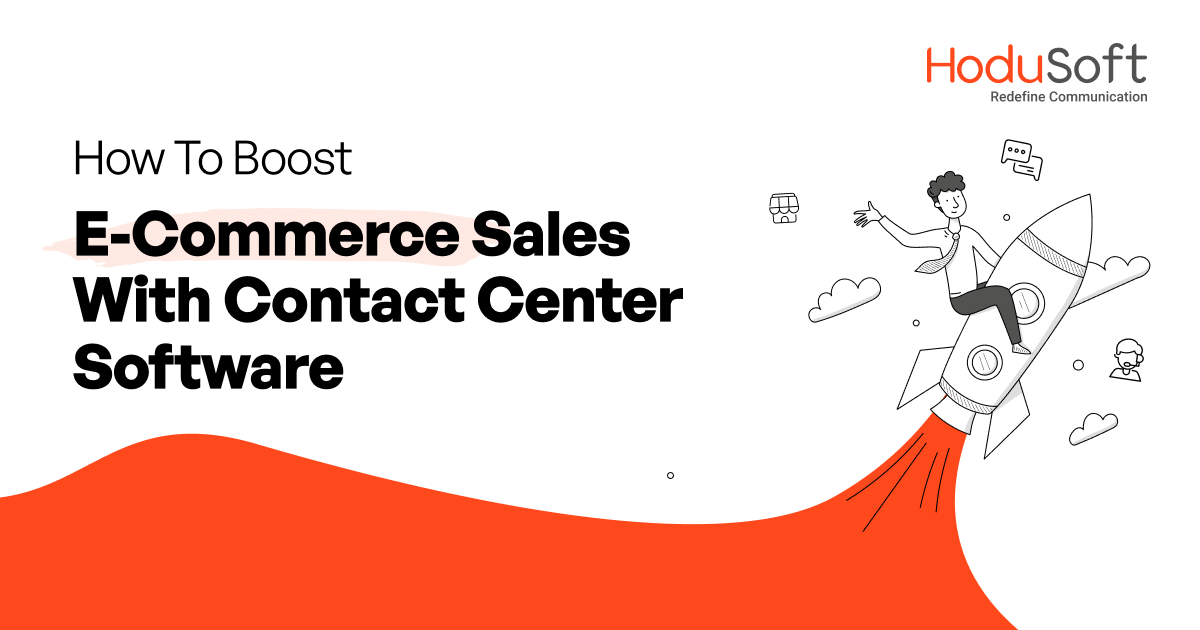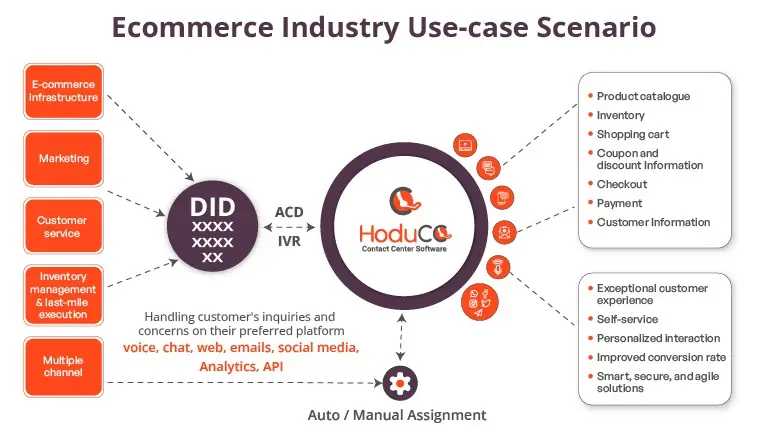How to Boost E-Commerce Sales with Contact Center Software
“What does the sales of an e-commerce company have to do with contact center software?” If this question comes to your mind, then we would like to start the blog post with a famous real-life incident covered in a recent podcast.
The guest, who is a highly skilled and experienced marketer and mentor of several successful content creators, asked the host, “There are hundreds of shoe companies in the world, why is Zappos one of the best?”
Zappos, a subsidiary of Amazon, is not only a shoe company but one of the most successful e-commerce companies in the world. In 2009, Amazon acquired Zappos in an all-stock deal worth around USD 1.2 billion.
When the host inquired, the guest replied, “That’s because the brand’s customer service is so good that their customer support representatives will even order a pizza for you if that’s what you want.”
He was absolutely right. One night, Zappo’s CEO Tony Hsieh took some of his clients out in the town and when they returned to their hotel room one of the clients wanted to have pizza. When they called the hotel’s room service, they found it closed for the night. So he suggested his client call his company’s customer service number.
And the client indeed called Zappos’ customer service at 2 am and requested the representative to place an order for him. And guess what, that’s exactly what happened.
Leveraging the right contact center software can enable e-commerce companies to provide high-quality customer service, which in turn goes a long way in enhancing sales and profitability.
At HoduSoft, we have helped many e-commerce companies increase their sales volume. Our specialized e-commerce contact center software is tailored for online retailers and it can be extremely effective in streamlining customer interactions, automating processes, and providing real-time analytics for better decision-making.
In this blog post, we have discussed how specialized e-commerce contact center software can enhance e-commerce sales. We explore how it enhances customer engagement, optimizes operational efficiency, and ultimately drives sales growth in the competitive e-commerce landscape.
Challenges E-Commerce Companies Face
Like every type of business, e-commerce companies face many challenges. While some are unique to the sector, others are quite prevalent and common in the present times. Let’s discuss some of those:

1. High Rate of Cart Abandonment
This problem is unique to the e-commerce industry. The term ‘cart abandonment’ means customers abandoning their online shopping carts just at the last minute. A Baymard Institute study found 70 percent of customers abandon their carts before checking out. Some common reasons for cart abandonment are slow page load speed, as errors in the website, complicated checkout or payment process, high shipping rates and taxes, or bad return policies.
2. Rising Costs
This challenge is quite common for all businesses in today’s time. The customer acquisition costs (CAC) of the e-commerce industry is quite high as a majority of products listed on e-commerce websites are low-ticket and enjoy lower margins compared to their high-ticket counterparts. Also, a recent LiveIntent survey showed that 85 percent of e-commerce firms and marketers are worried about rising costs of ads. More than half of them said that they’ll be priced out if the costs continue to increase.
3. Cutthroat Competition
Even though the e-commerce sector is recording an impressive growth rate, the competition is also increasing exponentially. Many new players are entering the industry with the hope of benefiting from the booming industry. Amid stiff and unhealthy competition, the new entrants are resorting to pricing wars that’s not only eating up their profits but also pushing up the costs.
4. Dwindling Customer Loyalty
Let’s be honest; we all have heard customers remaining loyal to their favorite brands, but how many customers remain loyal to an e-commerce site? For example, a customer who is loyal to a particular jeans brand is most likely to buy their favorite apparel from an online store that’s offering the best deals. According to several industry experts, the customer retention rate for the e-commerce industry is about 20-30 percent. Only two to three people out of every ten customers are more likely to remain with an e-commerce firm for a year.
5. Data Security
Are e-commerce companies susceptible to data leaks and cyberattacks? Oh, very much! The sheer volume of sensitive personal data and financial information they have of customers make them soft targets for hackers and cybercriminals. As per a data published by Threat Intelligence.com, 54 percent of e-commerce companies surveyed reported at least one successful data leak, cyberattack or fraudulent activities. Only 38 percent of them were able to deal with the attacks successfully.
6. Inventory Management
Inventory management is a challenge for many e-commerce companies. A recent data revealed that 60 percent of e-commerce companies surveyed said that they’re able to manage their inventory accurately. It’s quite distressing to know that 40 percent of online retailers find it difficult to manage their inventory.
7. Finding Their Competitive Edge
Ever wondered why some e-commerce companies are so successful compared to others? That’s because they’ve found their competitive advantage and are using it to their benefit. A majority of e-commerce companies offer similar products or services in the same price range. Almost all provide attractive deals during specific times of the year. So what’s the key differentiator? Well, that’s the secret sauce, and it can differ from one e-commerce firm to the other. For some companies, customer service is their key differentiator, while for others their return policy is.
8. Generation of Quality Leads
As per HubSpot’s findings, almost two-thirds of the businesses surveyed said that generating traffic and leads is their biggest marketing challenge. When it comes to the e-commerce sector, many companies face challenges in generating quality leads as they fail to target the right audience due to the huge online population.
9. Altering Digital Landscape
As e-commerce firms are heavily dependent on the digital ecosystem, the rapidly changing digital landscape and emergence of Artificial Intelligence (AI) and Machine Learning (ML) can pose a challenge for many. If some e-commerce players fail to leverage the new technology to their advantage, they would not only be left behind in the race, but they might also go out of business.
How Contact Center Software Can Boost E-Commerce Sales?
E-commerce companies can boost their sales by implementing contact center software that enables personalized customer support, streamlined order management, and efficient resolution of inquiries and concerns.
1. Enhanced Customer Service
Did you know that 86 percent of customers are willing to pay more for a better customer experience? If we go by the findings of some highly credible stats, that’s the number. What’s more important, as per data published in Huffington Post, 67 percent of customers cite bad customer experiences as a major reason for switching to another brand.
Both these stats highlight the role customer service plays in enhancing sales. When e-commerce companies provide high-quality customer service, they can enhance their sales. That’s exactly where sophisticated contact center software helps them enhance customer service.
2. Higher FCR Rate
Just imagine this scenario, a customer visits an online shopping website and while navigating the site or shopping, he or she faces some problems. What would the customer want when he or she contacts the customer service? That’s right, quick resolution of the issue. Only that will enable him or her to proceed with the shopping and complete the transaction. So you see, first contact resolution (FCR) has a huge effect on sales.
A sophisticated contact center software solution would enable an e-commerce company in enhancing its FCR rate in multiple ways. Its interactive voice response (IVR) system would enable callers to select their preferred language and route calls to callers’ preferred departments. The skill-based routing feature helps in directing incoming calls to the agents who have the right skills and expertise in solving specific problems of callers. And by doing so, advanced contact center software increases its sales and revenue.
3. Higher Customer Loyalty
Loyal customers are those who are delighted with a business (in this case, an e-commerce company) and they purchase from it repeatedly. It is not only five to seven times cheaper to retain an existing customer than attract a new one but loyal customers buy more often and spend more money on every purchase than regular ones.
Now, the question comes “How can contact center software increase customer loyalty?” When advanced contact center software provides e-commerce companies with robust features such as intelligent routing, CRM integration, and omnichannel support, businesses can effectively address customer needs and build strong relationships.
Advanced contact center software can help businesses win customer loyalty by offering personalized interactions, resolving issues swiftly, and maintaining consistency across all touchpoints. Additionally, by leveraging real-time analytics and customer feedback insights, companies can continuously improve their service quality, further enhancing customer satisfaction and loyalty.
4. Quality Lead Generation
In e-commerce business, lead generation is the key to success. But as discussed in the challenges, the generation of the right leads still remains a challenge for e-commerce companies as the huge online population makes it difficult to target the right audience. But leveraging the right e-commerce contact center software can be a game-changer for online retailers in generating quality leads.
The cutting-edge features such as CRM integration, intelligent routing, and real-time analytics and reporting can help with efficient management of customer inquiries and interactions. E-commerce companies can leverage advanced analytics and reporting features to tailor marketing strategies and product offerings.
How To Handpick the Right Contact Center Software for Your E-Commerce Business?

1. Determine the Key Features You Need
First thing first, you need to decide the key features you need in your contact center software. If you decide to invest in an inbound contact center solution then you will need to focus on features such as automatic call distribution, call queuing, CRM integration, interactive voice response (IVR) system, skill-based routing system, etc.
If you decide to invest in an outbound contact center solution, then you will need to zero in on features such as auto dialer, predictive dialer, scheduled call back, auto messaging, and more. List all the features you want your contact center software to have so that you can look for only those while you search for the software.
2. Set a Reasonable Budget
When it comes to buying contact center software, setting a reasonable budget is the most prudent thing you can do for your e-commerce business. Make sure that you carefully assess your business needs and prioritize features that align with your goals.
A budget is the foundation upon which you can build a scalable and efficient contact center infrastructure. By allocating resources wisely and investing in the right software solution, you can maximize your return on investment and propel your e-commerce business to new heights of success.
3. Browse the Internet for Reliable Software Providers
You know what features you want. You know how much money you’ve decided to invest. The next thing is to browse the internet to find reliable and reputable e-commerce contact center software providers.
Type search terms such as “best contact center software for e-commerce companies,” “e-commerce contact center software for small businesses,” or “affordable contact center software for small and medium online retailers.” If you want to be location-specific, consider using search terms with your country’s or city’s name such as “best e-commerce contact center software in US”, “best e-commerce contact center software in UK,” “best e-commerce contact center software in Canada,” “top e-commerce contact center software in Australia,” “affordable e-commerce contact center software in South Africa,” and so on.
4. Visit Websites and Compare Features
As you use such high-intent search terms, you will get a dozen of high-quality results on the first search engine result page. Some websites will be of software providers and from there you can explore different types of e-commerce contact center software solutions, their features, customer testimonials, pricing plans, information about free demo, and contact details. Some websites will belong to aggregators and that would enable you to get a bird’s-eye-view of 10 or 20 different contact center software.
Visit a mix of those websites, including some of the leading service providers, for a quick and easy comparison of their products, prices, and benefits. Explore their features, brand story, and information to make an informed decision about which contact center software aligns best with your e-commerce business needs and budget.
5. Contact Shortlisted Software Providers
After visiting some of the websites, you will have a fair idea about which software providers can meet your needs. Shortlist them and contact them as soon as possible. After all the research you’ve done by visiting various sites and comparing features, you will have a fair idea about which software providers can meet your needs. That’ll help you create a shortlist of software providers.
So, now that you have a shortlist with you, call the software providers one by one and ask them everything about their software, the features you need, the scalability and flexibility their software offers, the duration of their free demo, and more. If they refuse to provide a free demo, then end the call as politely as possible and call the next provider on the list. Repeat the process till you find someone who is willing to provide a free demo.
6. Try the Demo Version and Make an Informed Decision
Introduce the demo version of the e-commerce contact center software to your customer service team and ask them to use it till the trial period. Encourage them to explore its features, test its functionalities, and experience firsthand how it can streamline their workflow and enhance customer interactions.
After the demo period, gather their honest feedback and insights. Consider factors such as usability, effectiveness, and compatibility with existing systems. This firsthand experience will enable your team to make an informed decision about whether the software aligns with your business needs and objectives.
Summing Up,
The journey to e-commerce success is paved with strategic decisions and innovative solutions. By prioritizing customer service excellence and leveraging advanced contact center software, businesses can unlock the full potential of their online retail operations.
From enhancing customer satisfaction to streamlining operations and driving sales growth, the impact of these efforts is profound. As we continue to navigate the ever-evolving landscape of e-commerce, embracing these strategies will undoubtedly position businesses for sustained success and competitiveness in the digital marketplace. Ready to elevate your e-commerce game? Start implementing these insights today and watch your business thrive!




